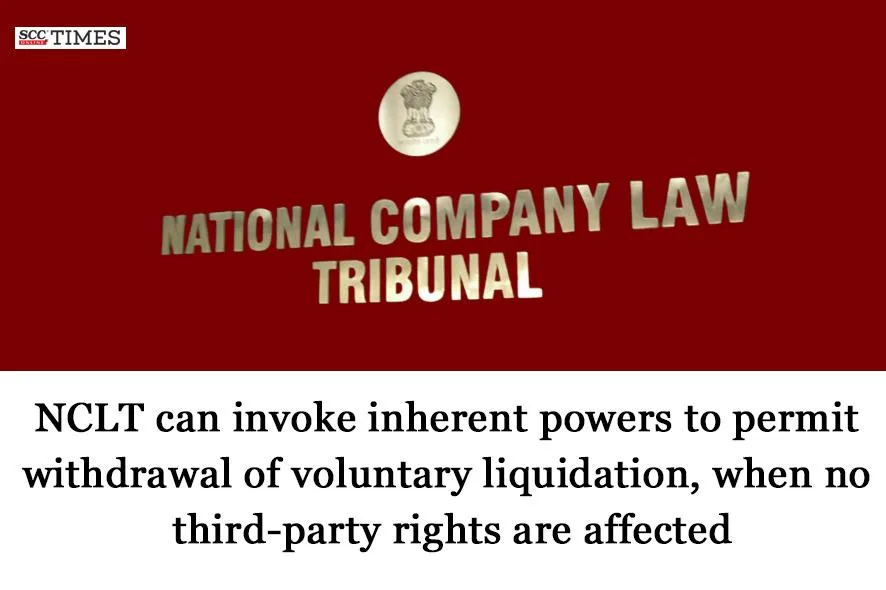National Company Law Tribunal, Chandigarh: In an instant application filed by the applicant, under Section 59, 60(5) and other applicable provisions of the Insolvency and Bankruptcy Code, 2016 (IBC), read with Insolvency and Bankruptcy Board of India (Voluntary Liquidation Process) Regulations, 2017 (‘Voluntary Liquidation Regulations’) for withdrawal of voluntary liquidation of the Company, the Bench of Harnam Singh Thakur, Member (Judicial) and Shishir Agarwal, Member (Technical), stated that in an exceptional cases, where the liquidation was initiated voluntarily and is now sought to be withdrawn by the same consenting stakeholders, and no third-party rights are affected, inherent powers of the Tribunal under Rule 11 of the National Company Law Tribunal Rules, 2016 (‘NCLT Rules, 2016’) can be invoked to meet the ends of justice.
Therefore, considering the peculiar facts and the revival prospects of the Company, the Tribunal exercised inherent jurisdiction under Rule 11 of the NCLT Rules, 2016, and allowed the withdrawal of the voluntary liquidation process.
Background
In the present case, the Company, a wholly owned subsidiary of ENEL Green Power India Private Limited, was incorporated under the provisions of the Companies Act, 1956 with the object to carry on the business of providing and generating renewable power. On 28-12-2022, the Board of Directors resolved to voluntarily liquidate the Company to reduce future operational expenses and appointed a Liquidator.
At the time of commencement of liquidation, the Company had no employees or workmen dues. However, due to evolving market conditions and the projected growth in the power sector, the management reconsidered and decided to withdraw the liquidation. This decision was communicated to the Liquidator, and in the Board Meeting, the Liquidator expressed no objection and confirmed that no asset sale or petition before the Adjudicating Authority had taken place. Shareholders passed a special resolution on the same day to approve withdrawal of the liquidation.
The Liquidator, formally stepped down, stating that the Directors may resume control of the Company. There are no pending litigations against the Company, and it has undertaken to pay all statutory dues, including fees to the Liquidator and other related expenses. Thus, the present application was filed before this Tribunal.
Case Analysis and Decision
The Tribunal acknowledged that while there is no explicit provision under the IBC or the Voluntary Liquidation Regulations for withdrawal of voluntary liquidation once commenced, such withdrawal may be considered under exceptional circumstances. In this case, the voluntary liquidation was not due to financial distress but was a commercial decision by the shareholders, who later unanimously resolved to reverse it. The Tribunal stated that it is equally open to the shareholders, where no prejudice is caused to any stakeholder, to reconsider and reverse their decision, particularly when the process has not proceeded to an irreversible stage, such as distribution of assets.
The Tribunal noted that the Board of Directors have unanimously resolved to withdraw the ongoing voluntary liquidation proceedings, which was thereafter duly ratified by the Members through a Special Resolution passed at the Extraordinary General Meeting held on the same date. Both resolutions clearly express the corporate decision to terminate the liquidation process, in accordance with Section 59(6) of the IBC, Regulation 4A of the Voluntary Liquidation Regulations, and guidance from the IBBI Discussion Paper dated 24-11-2020.
The Tribunal stated that these resolution reflected a clear and informed intent to revive the Company and resume its business operations. Further, the Liquidator, also confirmed his no-objection to the withdrawal of the liquidation proceedings. Thus, the Tribunal stated in such an exceptional case, where the liquidation was initiated voluntarily and is now sought to be withdrawn by the same consenting stakeholders, and no third-party rights are affected, inherent powers of the Tribunal under Rule 11 of the NCLT Rules, 2016 can be invoked to meet the ends of justice.
Therefore, considering the peculiar facts and the revival prospects of the Company, the Tribunal exercised inherent jurisdiction under Rule 11 of the NCLT Rules, 2016, and allowed the withdrawal of the voluntary liquidation process. Accordingly, the Tribunal directed the Liquidator to hand over the management and assets of the Company to its Board, after settling his legitimate fees and dues.
[Enel Green Power India (P) Ltd. v. Suman Kumar Verma, CP (IB) No. 3 (CH) 2024, decided on 1-7-2025]
Advocates who appeared in this case:
For the Applicant: Mohit Chaurasia, Ashutosh Gupta, Gaurav Rana & Ajitesh Kumar, Advocates.
For the Respondents: Suman Kumar Verma, Liquidator.


